Early Indologists – a Study in Motivation Part I
The First Pioneers of Indology
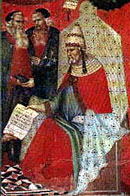 It may be surprising to learn that the first pioneer in indology was the 12th Century Pope, Honorius IV. The Holy Father encouraged the learning of oriental languages in order to preach Christianity amongst the pagans. Soon after this in 1312, the Ecumenical Council of the Vatican decided that-
It may be surprising to learn that the first pioneer in indology was the 12th Century Pope, Honorius IV. The Holy Father encouraged the learning of oriental languages in order to preach Christianity amongst the pagans. Soon after this in 1312, the Ecumenical Council of the Vatican decided that-
"The Holy Church should have an abundant number of Catholics well versed in the languages, especially in those of the infidels, so as to be able to instruct them in the sacred doctrine."
The result of this was the creation of the chairs of Hebrew, Arabic and Chaldean at the Universities of Bologna, Oxford, Paris and Salamanca. A century later in 1434, the General Council of Basel returned to this theme and decreed that –
"All Bishops must sometimes each year send men well-grounded in the divine word to those parts where Jews and other infidels live, to preach and explain the truth of the Catholic faith in such a way that the infidels who hear them may come to recognize their errors. Let them compel them to hear their preaching."1
Centuries later in 1870, during the First Vatican Council, Hinduism was condemned in the "five anathemas against pantheism" according to the Jesuit priest John Hardon in the Church-authorized book, The Catholic Catechism. However, interests in indology only took shape when the British came to India.
A Short History of the British in India
 Whilst the 17th century marked the zenith of India’s mediaeval glory, the 18th century was a flagrant display of degradation, misery, and anarchy. The Moghul Empire was at its end, the nobility had become corrupt and oppressive, and intellectual curiosity had given way to superstitious beliefs. The country was in a state of military and political turmoil, and literature, art and culture could hardly flourish in such an atmosphere. Into this scenario came the European traders.
Whilst the 17th century marked the zenith of India’s mediaeval glory, the 18th century was a flagrant display of degradation, misery, and anarchy. The Moghul Empire was at its end, the nobility had become corrupt and oppressive, and intellectual curiosity had given way to superstitious beliefs. The country was in a state of military and political turmoil, and literature, art and culture could hardly flourish in such an atmosphere. Into this scenario came the European traders.
It was the Portuguese and the Dutch who were the first Europeans to arrive in India. When the French and the British came on the scene, all parties began vying for commercial power over India’s ports. Through financial aid from their governments, treaties with local rulers and huge armies of mercenaries, the foreign trading companies gradually became more powerful than the deteriorating Moghul empire. The turning point came in 1757 when the British East India Company defeated an Indian army at the Battle of Plassey, and thus gained supremacy. Through treaties and annexation, the Company soon took full control of the subcontinent and ceded it to the British government.
At first, the British government remained cautious in forcing any religious change upon the Indians. This policy seemed to be practical in ruling several hundred million Indians without sparking off a rebellion. Or as one tea-dealer Mr.Twinning put it -
"As long as we continue to govern India in the mild, tolerant spirit of Christianity, we may govern it with ease; but if ever the fatal day should arrive, when religious innovation shall set her foot in that country, indignation will spread from one end of the Hindustan to the other, and the arms of fifty millions of people will drive us from that portion of the globe, with as much ease as the sand of the desert is scattered by the wind".
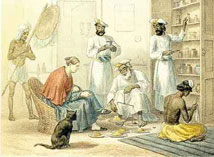 Another point of view in support of that policy was by Montgomery.
Another point of view in support of that policy was by Montgomery.
"Christianity had nothing to teach Hinduism, and no missionary ever made a really good Christian convert in India. He was more anxious to save the 30,000 of his country-men in India than to save the souls of all the Hindus by making them Christians at so dreadful a price".
Thus, under the authority of Lord Cornwallis (1786-1805) a mood of laissez-faire dominated the British attitude towards the Indian and his religious practices. The Governor-general in 1793 had decreed to -
"…preserve the laws of the Shaster and the Koran, and to protect the natives of India in the free exercise of their religion."
However, one year before this law was put into effect, the author Charles Grant wrote,
"The Company manifested a laudable zeal for extending, as far as its means went, the knowledge of the Gospel to the pagan tribes among whom its factories were placed."
In 1808 he described the opening of Christian missionary schools and translations of the Bible into Indian languages as "principal efforts made under the patronage of the British government in India, to impart to the natives a knowledge of Christianity." Despite this, the British showed little interest in Vedic scriptures. Doubtless this was in part a reflection of the usual British attitude to India during most of the period of the Raj - that India was simply a profitable nuisance.
Back home in England the various political parties had different opinions in how India should be managed. The Conservatives, though they accepted that to overthrow Indian tradition would be a difficult task, were interested in improving the Indian way of life, but stressed extreme caution for fear of an uprising. The Liberal party felt the gradual necessity of introducing western standards and values into India. The Rationalists had a more radical approach. Their belief was that reason could abolish human ignorance, and since the West was the champion of reason, the East would profit by its association.
It would be accurate to say that to the 18th century Englishmen, religion meant Christianity. Of course, racism played its part also. This attitude of Europeans toward Indians was due to a sense of superiority - a cherished conviction that was shared by every Englishman in India, from the highest to the lowest. Upon his arrival in 1810, the Governor-general Marquis of Hastings wrote:
"…the Hindoo appears a being merely limited to mere animal functions, and even in them indifferent...with no higher intellect than a dog..."
European Evangelism in India: William Carey
Christian evangelists were horrified that the Company could take the idolatry and improprieties of a pagan culture seriously. In their eyes, any kind of support or appreciation for the religion of the ‘pagans’ was tantamount to blasphemy. In 1825 the British scholar John Bentley wrote of his conflict with the scientist John Playfair, who was an admirer of Indian culture -
‘By his [Playfair's] attempt to uphold the antiquity of Hindu books against absolute facts, he thereby supports all those horrid abuses and impositions found in them, under the pretended sanction of antiquity....Nay, his aim goes still deeper; for by the same means he endeavors to overturn the Mosaic account, and sap the very foundation of our religion: for if we are to believe in the antiquity of Hindu books, as he would wish us, then the Mosaic account is all a fable, or fiction.’2
Seeing India as an unlimited field for missionary activity, and insisting that it was part of a Christian government's duty to promote this, Christian missionaries came to India without any government approval.
 William Carey (1761-1834) was the pioneer of the modern missionary enterprise in India, and of western (missionary) scholarship in oriental studies. Carey was an English oriental scholar and the founder of the Baptist Missionary Society. From 1801 onward, as Professor of Oriental Languages, he composed numerous philosophical works, consisting of 'grammars and dictionaries in the Marathi, Sanskrit, Punjabi, Telugu, Bengali and Bhatanta dialects. From the Serampor press, there issued in his life time, over 200,000 Bibles and portions in nearly 40 different languages and dialects, Carey himself undertaking most of the literary work. 3
William Carey (1761-1834) was the pioneer of the modern missionary enterprise in India, and of western (missionary) scholarship in oriental studies. Carey was an English oriental scholar and the founder of the Baptist Missionary Society. From 1801 onward, as Professor of Oriental Languages, he composed numerous philosophical works, consisting of 'grammars and dictionaries in the Marathi, Sanskrit, Punjabi, Telugu, Bengali and Bhatanta dialects. From the Serampor press, there issued in his life time, over 200,000 Bibles and portions in nearly 40 different languages and dialects, Carey himself undertaking most of the literary work. 3
Carey and his colleagues experimented with what came to be known as Church Sanskrit. He wanted to train a group of 'Christian Pandits' who would probe "these mysterious sacred nothings" and expose them as worthless. He was distressed that this "golden casket (of Sanskrit) exquisitely wrought" had remained "filled with nothing but pebbles and trash." He was determined to fill it with "riches - beyond all price," that is, the doctrine of Christianity. 4
In fact, Carey smuggled himself into India and caused so much trouble that the British government labeled him as a political danger. After confiscating a batch of Bengali pamphlets printed by Carey, the Governor-general Lord Minto described them as –
"Scurrilous invective…Without arguments of any kind, they were filled with hell fire and still hotter fire, denounced against a whole race of men merely for believing the religion they were taught by their fathers."
Unfortunately Carey and other preachers of his ilk finally gained permission to continue their campaigns without government approval.
Other Preachers
Another preacher, William Archer, wrote in his book, India and the Future –
"The plain truth concerning the mass of the [Indian] population — and the poorer classes alone — is that they are not civilized people."
Reverend A.H. Bowman wrote that Hinduism was a –
"…great philosophy which lives on unchanged whilst other systems are dead, which as yet unsupplanted has its stronghold in Vedanta, the last and the most subtle and powerful foe of Christianity."
In 1790, Dr.Claudius Bucchanan, a missionary attached to the East India Company, arrived in Bengal. Not long after his arrival, the good doctor stated-
"Neither truth, nor honesty, honor, gratitude, nor charity, is to be found in the breast of a Hindoo."
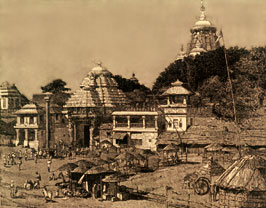 Bucchanan traveled to Puri in Orissa and witnessed the annual Ratha-yatra (or as Bucchanan called it, ‘The horrors of Juggernaut’). His description of Jagannatha – ‘The Indian Moloch’, has been recorded by the historian George Gogerly as- "…a frightful visage painted black, with a distended mouth of bloody horror." Perhaps, by seeing the face of Lord Jagannatha, the British hallucinated and saw a projection of their own international destiny of bloodshed and carnage. In any case, from the time the British observed the ‘terrifying’ sight of the Lord on His gigantic chariot, the word ‘juggernaut’ entered the English language and became synonymous with any great force that crushes everything in its path. Gogerly went on to write –
Bucchanan traveled to Puri in Orissa and witnessed the annual Ratha-yatra (or as Bucchanan called it, ‘The horrors of Juggernaut’). His description of Jagannatha – ‘The Indian Moloch’, has been recorded by the historian George Gogerly as- "…a frightful visage painted black, with a distended mouth of bloody horror." Perhaps, by seeing the face of Lord Jagannatha, the British hallucinated and saw a projection of their own international destiny of bloodshed and carnage. In any case, from the time the British observed the ‘terrifying’ sight of the Lord on His gigantic chariot, the word ‘juggernaut’ entered the English language and became synonymous with any great force that crushes everything in its path. Gogerly went on to write –
"The whole history of this famous god (Krsna) is one of lust, robbery, deceit and murder…the history of the whole hierarchy of Hindooism is one of shameful iniquity, too vile to be described."
The prominent missionary, Alexander Duff (1806-1878) founded the Scottish Churches College, in Calcutta, which he envisioned as a "headquarters for a great campaign against Hinduism." Duff sought to convert the Indians by enrolling them in English-run schools and colleges, and placed emphasis on learning Christianity through the English language. Duff wrote -
"While we rejoice that true literature and science are to be substituted in place of what is demonstrably false, we cannot but lament that no provision has been made for substituting the only true religion-Christianity - in place of the false religion which our literature and science will inevitably demolish… Of all the systems of false religion ever fabricated by the perverse ingenuity of fallen man, Hinduism is surely the most stupendous."
Duff received remarkable success in his educational and missionary activities amongst the higher classes in Calcutta. The number of students in the mission schools was four times higher than that in government schools.
It is an axiomatic truth that the aim of missionaries like Duff was not so much education than conversion. They were obliged to use the excuse of education in order to meet he needs of the converted population, and more importantly, to train up Indian assistants to help them in their proselytizing. Duff remained unsatisfied with converting Indians belonging to low-castes and orphans – his chosen target was the higher castes, specifically the brahmanas, in order to accelerate the demise of Hinduism.
Many Englishmen patronized missionary schools such as Duffs. Charles Trevelyan, an officer with the East India Company asserted in a widely circulated tract-
" The multitudes who flock to our schools ... cannot return under the dominion of the Brahmins. The spell has been forever broken. Hinduism is not a religion that will bear examination... It gives away at once before the light of European sciences."
J.N. Farquhar, a Scottish clergyman, preached in India from 1891 to 1923, during which time he wrote a book called The Crown of Hinduism. In this work he says that although Hinduism may have some good points, ultimately true salvation can only be achieved through Christ, who is the ‘crown of Hinduism’.
Reverend William Ward, an English missionary, wrote a four-volume polemic in which he characterized the Hindu faith as "a fabric of superstition" concocted by Brahmins, and as "the most complete system of absolute oppression that perhaps ever existed".
Richard Temple, a high officer, said in an 1883 speech to a London missionary society:
" India presents the greatest of all fields of missionary exertion... India is a country which of all others we are bound to enlighten with external truth...But what is most important to you friends of missions, is this - that there is a large population of aborigines, a people who are outside caste....If they are attached, as they rapidly may be, to Christianity, they will form a nucleus round which British power and influence may gather."
He addressed a mission in New York in bolder terms:
"Thus India is like a mighty bastion which is being battered by heavy artillery. We have given blow after blow, and thud after thud, and the effect is not at first very remarkable; but at last with a crash the mighty structure will come toppling down, and it is our hope that someday the heathen religions of India will in like manner succumb."
Indian religion was thus perceived by the British missionaries as an enemy waiting to be conquered by the army of Jesus. It was a doctrine of Satan which provided Christianity with devils to exorcise and which, in their view, was "at best, work of human folly and at worst the outcome of a diabolic inspiration." 5
In the word of Charles Grant (1746-1823), Chairman of the East India Company:
"We cannot avoid recognizing in the people of Hindustan a race of men lamentably degenerate and base...governed by malevolent and licentious passions...and sunk in misery by their vices."
One Professor McKenzie, of Bombay found the ethics of India defective, illogical and anti-social, lacking any philosophical foundation, nullified by abhorrent ideas of asceticism and ritual and altogether inferior to the 'higher spirituality' of Europe. He devoted most of his book 'Hindu Ethics' to upholding this thesis and came to the conclusion that Vedic philosophical ideas, 'when logically applied leave no room for ethics'; and that they prevent the development of a strenuous moral life.'
All efforts were made by the missionaries to portray Hinduism as backwards, illogical, debauched and perverse. As one preacher exclaimed,
'The curse of India is the Hindoo religion. More than two hundred million people believe a monkey mixture of mythology that is strangling the nation.' 'He who yearns for God in India soon loses his head as well as his heart.'
The missionaries opposed the government’s efforts to take a neutral stand towards Indian culture and worked with more zeal for the complete conversion of the natives. Thus India became an arena for religious adventure.
The First Scholars: Sir William Jones
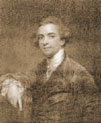 Sir William Jones (1746-1794) was the first Britisher to learn Sanskrit and study the Vedas. He was educated at Oxford University and it was here that he studied law and also began his studies in oriental languages, of which he is said to have mastered sixteen. After being appointed as judge of the Supreme Court, Jones went to Calcutta in 1783. He founded the Royal Asiatic Society of Bengal and translated a number of Sanskrit texts into English. Jones was not prone to criticize other religions, especially the Vedic religion, which he respected and adored. He wrote –
Sir William Jones (1746-1794) was the first Britisher to learn Sanskrit and study the Vedas. He was educated at Oxford University and it was here that he studied law and also began his studies in oriental languages, of which he is said to have mastered sixteen. After being appointed as judge of the Supreme Court, Jones went to Calcutta in 1783. He founded the Royal Asiatic Society of Bengal and translated a number of Sanskrit texts into English. Jones was not prone to criticize other religions, especially the Vedic religion, which he respected and adored. He wrote –
"I am in love with Gopia, charmed with Crishen (Krishna), an enthusiastic admirer of Raama and a devout adorer of Brihma (Brahma), Bishen (Vishnu), Mahisher (Maheshwara); not to mention that Judishteir, Arjen, Corno (Yudhishtira, Arjuna, Karna) and the other warriors of the M'hab'harat appear greater in my eyes than Agamemnon, Ajax and Achilles apperaed when I first read the Iliad" 6
However, Jones was a devout Christian and could not free himself of the restraints of Biblical chronology. His theories of dating Indian history, specifically Candragupta Maurya’s reign up to the invasions of India by Alexander were certainly dictated to him through religious bias. He also described the Srimad Bhagavatam as "a motley story" and claimed that it had it’s roots in the Christian Gospels, which had been brought to India and, ‘repeated to the Hindus, who ingrafted them on the old fable of Ce’sava, (Kesava)’. Of course, this theory has been debunked since records of Krsna worship predate Christ by centuries. (See Heliodorus Column)
In 1840 Jones was appointed Chief Justice in the British settlement of Fort William. Here, in 1846, he translated into English the famous play ‘Sakuntala’ by Kalidasa and ‘The Code of Manu’ in 1851, the year of his death. After him, his younger associate, Sir Henry Thomas Colebrooke, continued in his stead and wrote many articles on Hinduism.
The eminent British historian James Mill (father of the philosopher John Stuart Mill) who had published his voluminous History of British India in 1818 heavily criticized Jones. Although Mill spoke no Indian languages, had never studied Sanskrit, and had never been to India, his damning indictment of Indian culture and religion had become a standard work for all Britishers who would serve in India. Mill vehemently believed that India had never had a glorious past and treated this as an historical fantasy. To him, Indian religion meant, ‘The worship of the emblems of generative organs’ and ascribing to God, ‘…an immense train of obscene acts.’ Suffice to say that he disagreed violently with Jones for his ‘Hypothesis of a high state of civilization.’ Mill’s History of British India was greatly influenced by the famous French missionary Abbe Dubois’s book Hindu Manners, Customs and Ceremonies. This work, which still enjoys a considerable amount of popularity to this day, contains one chapter on Hindu temples, wherein the Abbe writes:
"Hindu imagination is such that it cannot be excited except by what is monstrous and extravagant."
H.H. Wilson
Horace Hayman Wilson (1786-1860) has been described as ‘the greatest Sanskrit scholar of his time’. He received his education in London and traveled to India in the East India Companies medical service. He became the secretary of the Asiatic Society of Bengal from 1811 to 1833 and published a Sanskrit to English dictionary. He became Boden professor of Sanskrit at Oxford in 1833 and the director of the Royal Asiatic Society in 1837. He translated the Visnu Purana, Rg Veda and wrote books such as Lectures on the Religious and Philosophical Systems of the Hindus. He edited a number of translations of eastern texts and helped Mill compile his History of India, although later Wilson criticized Mill’s historiography, stating –
"Mill’s view of Hindu religion is full of very serious defects, arising from inveterate prejudices and imperfect knowledge. Every text, every circumstance, that makes against the Hindu character, is most assiduously cited, and everything in its favor as carefully kept out of sight, whilst a total neglect is displayed of the history of Hindu belief."7
Wilson seemed somewhat of an enigma; on one hand he proposed that Britain should restrain herself from forcing Christianity upon the Indians and forcing them to reject their old traditions. Yet in the same breath he exclaimed:
"From the survey which has been submitted to you, you will perceive that the practical religion of the Hindus is by no means a concentrated and compact system, but a heterogeneous compound made up of various and not infrequently incompatible ingredients, and that to a few ancient fragments it has made large and unauthorized additions, most of which are of an exceedingly mischievous and disgraceful nature. It is, however, of little avail yet to attempt to undeceive the multitude; their superstition is based upon ignorance, and until the foundation is taken away, the superstructure, however crazy and rotten, will hold together."
Wilson’s view was that Christianity should replace the Vedic culture, and he believed that full knowledge of Indian traditions would help effect that conversion. Aware that the Indians would be reluctant to give up their culture and religion, Wilson made the following remark:
 "The whole tendency of brahminical education is to enforce dependence upon authority – in the first instance upon the guru, the next upon the books. A learned brahmana trusts solely to his learning; he never ventures upon independent thought; he appeals to memory; he quotes texts without measure and in unquestioning trust. It will be difficult to persuade him that the Vedas are human and very ordinary writings, that the puranas are modern and unauthentic, or even that the tantras are not entitled to respect. As long as he opposes authority to reason, and stifles the workings of conviction by the dicta of a reputed sage, little impression can be made upon his understanding. Certain it is, therefore, that he will have recourse to his authorities, and it is therefore important to show that his authorities are worthless."
"The whole tendency of brahminical education is to enforce dependence upon authority – in the first instance upon the guru, the next upon the books. A learned brahmana trusts solely to his learning; he never ventures upon independent thought; he appeals to memory; he quotes texts without measure and in unquestioning trust. It will be difficult to persuade him that the Vedas are human and very ordinary writings, that the puranas are modern and unauthentic, or even that the tantras are not entitled to respect. As long as he opposes authority to reason, and stifles the workings of conviction by the dicta of a reputed sage, little impression can be made upon his understanding. Certain it is, therefore, that he will have recourse to his authorities, and it is therefore important to show that his authorities are worthless."
Wilson felt hopeful that by inspired, diligent effort the "specious" system of Vedic thought would be "shown to be fallacious and false by the Ithuriel spear of Christian truth. He also was ready to award a prize of two hundred pounds "…for the best refutation of the Hindu religious system." Wilson also wrote a detailed method for exploiting the native Vedic psychology by use of a bogus guru-disciple relationship.
Recently Wilson has been accused of invalid scholarship. Natalie P.R. Sirkin has presented documented evidence, which shows that Wilson was a plagiarist. Most of his most important works were collected manuscripts of a deceased author that he published under his own names, as well as works done without research.
Thomas Babbington Macaulay
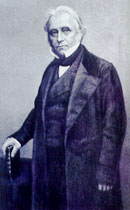 Thomas Babbington Macaulay (1800-59) is best known for introducing English education in India. Though not a missionary himself, he believed that Christianity held the key to the problem of curing India’s ignorance. Although he confessed to have no knowledge of Sanskrit and Arabic, he did not hesitate to belittle the religious works of the East. In 1838 there was some debate on India’s Supreme Ruling Council, chaired by Lord Bentinck. 8
Thomas Babbington Macaulay (1800-59) is best known for introducing English education in India. Though not a missionary himself, he believed that Christianity held the key to the problem of curing India’s ignorance. Although he confessed to have no knowledge of Sanskrit and Arabic, he did not hesitate to belittle the religious works of the East. In 1838 there was some debate on India’s Supreme Ruling Council, chaired by Lord Bentinck. 8
As to the value of teaching Sanskrit and India’s classical literatures, as well as regional languages, in schools to be established by the British for the education of the Indian people, A few members of the Council were mildly in favor of it, but the elegantly expressed, fully ethnocentric and Philistine view of Macaulay prevailed. In his Education Minute, Macaulay wrote that he couldn’t find one Orientalist.
"…who could deny that a single shelf of good European library is worth the whole native literature of India and Arabia…Are we to teach false history, false astronomy, false medicine because we find them in company with false religion? The intrinsic superiority of the Western literature is, indeed, fully admitted by those members of the Committee who support the Oriental plan of education…The superiority of the Europeans becomes absolutely immeasurable."
He went on to make the outrageous assertion that –
"…all the historical information which has been collected from all the books written in the Sanscrit language is less valuable than what may be found in the most paltry abridgements used in preparatory schools in England."
He then made the following creatively expressed, though uneducated assertion as his central statement of belief –
"The question now before us is simply whether, when it is in our power to teach the (English) language, we shall teach language in which…there are no books on any subject which deserve to be compared to our own…whether, when we can patronize sound philosophy and true history, we shall countenance at the public expense medical doctrines which would disgrace an English farrier, astronomy which would move laughter in girls at an English boarding school, history abounding in kings thirty feet high and reigns thirty-thousand years long, and geography made up of seas of treacle and rivers of butter… I would at once stop the printing of Arabic and Sanscrit books, I would abolish the Madrassa and the Sanscrit (sic) college at Calcutta."
In a letter to his father in 1836, Macaulay exclaimed –
"...It is my belief that if our plans of education are followed up, there will not be a single idolator among the respectable classes in Bengal thirty years hence. And this will be effected without any efforts to proselytize, without the smallest interference with religious liberty, by natural operation of knowledge and reflection. I heartily rejoice in the project."
In other words, Lord Macaulay believed that by knowledge and reflection, the Hindus would turn their backs upon the religion of their forefathers and take up Christianity. In order to do this, he planned to use the strength of the educated Indians against them by using their scholarship to uproot their own traditions, or in his own words - " Indian in blood and color, but English in taste, in opinion, in morals, in intellect." He firmly believed that, "No Hindu who has received an English education ever remains sincerely attached to his religion."
To further this end Macaulay wanted a competent scholar who could interpret the Vedic scriptures in such a manner that the newly educated Indian youth would see how barbaric their native superstitions actually were. Macaulay finally found such a scholar in Fredrich Max Mueller.
Early Indologists – a Study in Motivation Part II
Fredrich Max Mueller
 Fredrich Max Mueller (1823-1900) was born in Dessau and educated in Leipzig, where he learned Sanskrit and translated the Hitopadesa of Pandita Visnu Sarma before coming to England in 1846. Since he was penniless, he was cared for by Baron von Bunsen, the Prussian ambassador to England who basked in the childishly pleasant thought of converting the whole world to Christianity. It was in London that Max Mueller met Macaulay who was still on the look out for his ‘right man’.
Fredrich Max Mueller (1823-1900) was born in Dessau and educated in Leipzig, where he learned Sanskrit and translated the Hitopadesa of Pandita Visnu Sarma before coming to England in 1846. Since he was penniless, he was cared for by Baron von Bunsen, the Prussian ambassador to England who basked in the childishly pleasant thought of converting the whole world to Christianity. It was in London that Max Mueller met Macaulay who was still on the look out for his ‘right man’.
Mueller was first commissioned by the East India Company to translate the Rg Veda into English. The company agreed to pay the young Mueller 4 Shillings for each page that was ready to print. He later moved to Oxford where he translated a number of books on Eastern religion. His magnum opus was his series The Sacred Books of the East, a fifty volume work which he began editing in 1875. It goes without saying that by the end of his career, Mueller had amassed a comfortable sum of money.
It is ironic that the man who has Bhavans named after him all over India and is treated with so much veneration there, probably did the most damage to uproot Vedic culture.
At the time of his death he was venerated by none other than Lokamanya Tilak as ‘Veda-maharishi Moksha-mula Bhatta of Go-tirtha’ (Oxford).
Although Mueller is on record as extoling India’s ancient wisdom, his letters (printed in two volumes) tell an entirely different story. Generally personal letters give a true picture of the writer's inner mind. We present herein some of Mueller’s many statements in which his true view on Indian culture is glaringly obvious -
"History seems to teach that the whole human race required a gradual education before, in the fullness of time, it could be admitted to the truths of Christianity. All the fallacies of human reason had to be exhausted, before the light of a high truth could meet with ready acceptance. The ancient religions of the world were but the milk of nature, which was in due time to be succeeded by the bread of life.... 'The religion of Buddha has spread far beyond the limits of the Aryan world, and to our limited vision, it may seem to have retarded the advent of Christianity among a large portion of the human race. But in the sight of Him with whom a thousand years are but as one day, that religion, like the ancient religions of the world, may have but served to prepare the way of Christ, by helping through its very errors to strengthen and to deepen the ineradicable yearning of the human heart after the truth of God."
"Large number of Vedic hymns are childish in the extreme; tedious, low, commonplace."
"Nay, they (the Vedas) contain, by the side of simple, natural, childish thoughts, many ideas which to us sound modern, or secondary and tertiary."
"...this edition of mine and the translation of the Vedas, will hereafter tell to a great extent on the fate of India and on the growth of millions of souls in that country. It (the Rg Veda) is the root of their religion and to show them what the root is, I am sure, the only way of uprooting all that has sprung from it during the last three thousand years" 9
"Hinduism was dying or dead because it belonged to a stratum of thought which was long buried beneath the foot of modern man. He continued: " The worship of Shiva, Vishnu, and other popular deities was of the same and in many cases of a more degraded and savage character than the worship of Jupiter, Apollo or Minerva. 'A religion', he said ' may linger on for a long time, it may be accepted my large masses of the people, because it is there, and there is nothing better. But when a religion has ceased to produce defenders of the faith, prophets, champions, martyrs, it has ceased to live, in the true sense of the word; and in that sense the old orthodox Brahmanism has ceased to live for more than a thousand years." (Speech at the Christians Missions in Westminster Abbey in 1873) 10
In 1876, while writing to a friend, Mueller said that he would not like to go to India as a missionary since that would make him dependent upon the government. His preference was this -
"I would like to live for ten years quite quietly and learn the language, try to make friends, and then see if I was fit to take part in this work, by means of which the old mischief of Indian priestcraft could be overthrown and the way opened for the entrance of simple Christian teaching…India is much riper for Christianity than Rome or Greece were at the time of Saint Paul."
"The rotten tree for some time had artificial supports ...but if the English man comes to see that the tree must fall...he will mind no sacrifice either of blood or of land...I would like to lay down my life, or at least lend my hand to bring about this struggle" 11
"I do not claim for the ancient Indian literature any more that I should willingly concede to the fables and traditions and songs of savage nations. I simply say that in the Veda we have a nearer approach to a beginning, and an intelligent beginning, than in the wild invocations of the Hottentotes and Bushmen, " 12
"This edition of mine and the translation of the Veda will hereafter tell to a great extent... the fate of India, and on the growth of millions of souls in that country. It is the root of their religion, and to show them what the root is, I feel sure, the only way of uprooting all that has sprung from it during the last 3000 years." 13
When Duke of Argyll was appointed Secretary of State for India in December 1868, Max Mueller wrote to him-
"India has been conquered once, but India must be conquered again and that second conquest should be a conquest by education…the ancient religion of India is doomed, and if Christianity does not step in, whose fault will it be?" 14
In another letter, Mueller wrote to his son:
'Would you say that any one sacred book is superior to all others in the world? ....I say the New Testament, after that, I should place the Koran, which in its moral teachings, is hardly more than a later edition of the New Testament. Then would follow according to my opinion the Old Testament, the Southern Buddhist Tripitaka, the Tao-te-king of Lao-tze, the Kings of Confucius, the Veda and the Avesta.' 15
In an audacious letter to N.K. Majumdar, Mueller wrote –
'Tell me some of your chief difficulties that prevent you and your countrymen from openly following Christ, and when I write to you I shall do my best to explain how I and many who agree with me have met them and solved them...From my point of view, India, at least the best part of it, is already converted to Christianity. You want no persuasion to become a follower of Christ. Then make up your mind to work for yourself. Unite your flock - to hold them together and prevent them from straying. The bridge has been built for you by those who came before you. STEP BOLDLY FORWARD, it will break under you, and you will find many friends to welcome you on the other shore and among them none more delighted that you old friend and fellow labourer F. Max-Muller.' 16
Mueller harshly criticised the view of the German scholar, Dr. Spiegel, who claimed that the Biblical theory of the creation of the world is borrowed from the ancient religion of the Persians or Iranians. Stung by this statement Max Mueller writes:
‘A writer like Dr. Spiegel should know that he can expect no money; nay, he should himself wish for no mercy, but invite the heaviest artillery against the floating battery which he has launched in the troubled waters of Biblical criticism.’
Dr. Spiegel was not the only target of Mueller’s bigotry. In 1926 the French scholar Louis Jacolliot, Chief Judge in Chandranagar, wrote a book called 'La Bible dans l'Inde'. Within that book, Jacolliot theorised that all the main philosophies of the western world originated from India, which he glorified thus:
'Land of ancient India! Cradle of Humanity. hail! Hail revered motherland whom centuries of brutal invasions have not yet buried under the dust of oblivion. Hail, Fatherland of faith, of love, of poetry and of science, may we hail a revival of thy past in our Western future.'
Mueller said while reviewing Jacolliot’s book that, 'The author seems to have been taken in by the Brahmins of India.'
Mueller may also be credited with the popularization of the aryan racial theory, Writing for the Anthropological Review in 1870, Mueller classified the human race into seven categories on an ascending scale - with the Aborigines on the lowest rung and the "Aryan" type supreme.
However, he recanted later on when his professional reputation as a Sanskrit scholar was in peril.
"I have declared again and again that if I say Aryas, I mean neither blood nor bones, nor hair, nor skull; I mean simply those who speak an Aryan language...to me an ethnologist who speaks of Aryan race, Aryan blood, Aryan eyes and hair, is as great a sinner as a linguist who speaks of a dolichocephalic dictionary or a brachycephalic grammar." 17
Although Mueller cannot be placed in the same category as inexperienced Indologists such as Christian Lassen and Albrecht Weber whose Aryan race conceptions were chiefly fueled by their ardent German nationalism, Mueller’s motivations were just as diabolical. Mueller had been paid to misinterpret the Vedic literatures in order to make the Indians look, at best silly, and at worst, bestial.
However, not everyone was taken in by the academic prowess of the man who was known as ‘Moksamula Bhatta’. Swami Dayananda Saraswati, the founder of the Arya Samaja, was so disgusted with the level of Mueller’s knowledge of Sanskrit that he likened him to a "toddler learning to walk". He wrote:
"Prof. Max Mueller has been able to scribble out something by the help of the so called 'tikas' or paraphrases of the Vedas current in India." 19
Another revealing incident of Mueller’s glaring ignorance was when a brahmana came from India to meet the famous Sanskrit scholar. When he came face to face with Mueller and spoke to him in chaste Sanskrit, Mueller admitted that he couldn’t understand what the gentleman was saying!
No wonder Schopenhauer acerbically said, "I cannot resist a certain suspicion that our Sanskrit scholars do not understand their texts any better than the higher class of school boys their Greek and Latin."
Sir Monier Monier-Williams and the Boden Chair
Sir Monier Monier-Williams (1819-1899) was born in Bombay, attending the East India Company’s college and later teaching there. After the death of H.H. Wilson, Monier-Williams became Boden Professor of Sanskrit in Oxford University where he delivered an address wherein he stated -‘I must draw attention to the fact that I am only the second occupant of the Boden Chair, and that its Founder, Colonel Boden, stated most explicitly in his will (dated August 15, 1811 A.D.) that the special object of his munificent bequest was to promote the translation of Scriptures into Sanskrit; so as to enable his countrymen to proceed in the conversion of the natives of India to the Christian religion.’
'Brahmanism, therefore, must die out. In point of fact, false ideas on the most ordinary scientific subjects are so mixed up with its doctrines that the commonest education - the simplest lesson in geography - without the aid of Christianity must inevitably in the end sap its foundations.'
'When the walls of the mighty fortress of Brahmanism are encircled, undermined, and finally stormed by the solders of the cross, the victory of Christianity must be signal and complete.'
In 1870 Monier-Williams wrote a book based on a lecture called 'The Study of Sanskrit in Relation to Missionary work in India' which was obviously written in order to promote Christianity and discredit the Vedic scriptures. He also wrote another work in 1894 called ‘Hinduism which was published and distributed by the Society for Promoting Christian Knowledge. He is known mostly for his ‘Sanskrit-English Dictionary’ and for spending twenty-five years to founding an institution in Oxford disseminating information on Indian religion, philosophy and culture.
In is interesting to note that Monier-Williams disagreed with the ‘evolution to Christianity’ theory of Max Mueller. Refering to this he wrote –
‘There can be no doubt of a greater mistake than to force these non-Christian bibles into conformity with some scientific theory of development and then point to Christian’s Holy Bible as the crowning product of religious evolution. So far from this, these non-Christian bibles are all developments in the wrong direction. They all begin with some flashes of true light and end in utter darkness.’
‘It seems to me that our missionaries are already sufficiently convinced of the neccessity of studying these works, and of making themselves conversant with the false creeds they have to fight against. How could an army of invaders have any chance of success in an enemy’s country without a knowledge of the position and strength of its fortresses, and without knowing how to turn the batteries they may capture against the for?' 20
German Indologists:
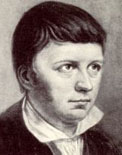
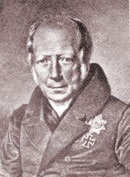 In 1875, August Wilhelm von Schlegal (brother of the philosopher Friedrich Schlegel) became the first professor of Sanskrit in the Bonn University of Germany. Previously, in 1865 he had written a work entitled 'Upon the languages and Wisdom of the Hindus'. Both the Schlegal brothers had a great love for Sanskrit. Another Sanskritist Hern Wilhelm von Humboldt became the collaborator of August Schlegel whose edition of the Bhagavad-gita directed his attention to its study. In 1884 he wrote to a friend saying: 'It is perhaps the deepest and loftiest thing the world has to show'.
In 1875, August Wilhelm von Schlegal (brother of the philosopher Friedrich Schlegel) became the first professor of Sanskrit in the Bonn University of Germany. Previously, in 1865 he had written a work entitled 'Upon the languages and Wisdom of the Hindus'. Both the Schlegal brothers had a great love for Sanskrit. Another Sanskritist Hern Wilhelm von Humboldt became the collaborator of August Schlegel whose edition of the Bhagavad-gita directed his attention to its study. In 1884 he wrote to a friend saying: 'It is perhaps the deepest and loftiest thing the world has to show'.
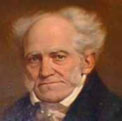 At that time Arthur Schopenhauer (1845-1917), the great German philosopher, read the Latin translation of the Upanisads which were translated by a French writer Anquetil du Perron from the Persian translation of Prince Dara Shikoh named as ‘Sirre-Akbar’ (The Great Secret). He was so impressed by their philosophy that he called them 'The production of the highest human wisdom', and considered them to contain superhuman conceptions. The Upanisads was a great source of inspiration to Schopenhauer, and writing about them he said:
At that time Arthur Schopenhauer (1845-1917), the great German philosopher, read the Latin translation of the Upanisads which were translated by a French writer Anquetil du Perron from the Persian translation of Prince Dara Shikoh named as ‘Sirre-Akbar’ (The Great Secret). He was so impressed by their philosophy that he called them 'The production of the highest human wisdom', and considered them to contain superhuman conceptions. The Upanisads was a great source of inspiration to Schopenhauer, and writing about them he said:
'It is the most satisfying and elevating reading (with the exception of the original text) which is possible in the world;' it has been the solace of my life and will be the solace of my death.’
It is well-known that the book 'Oupnekhat' (Upanisad) always lay open on his table and he invariably studied it before sleeping.at night. He called the opening up of Sanskrit literature 'the greatest gift of our century', and predicted that the philosophy and knowledge of the Upanisads would becomes the cherished faith of the West.
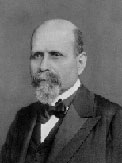
Unfortunately, not all scholars appreciated the timeless wisdom of the Vedas and Upanisads. Some scholars were so convinced of the superiority of Christianity and western philosophy that they had no qualms in shamelessly expressing their feelings publicly.
In 1925 The Professor of Indian Studies at the German University of Prague, Moriz Winternitz (1863-1937), denounced Schopenhaur for his admiration of the Upanisads with the following words -
'Yet I believe, it is a wild exaggeration when Schopenhauer says that the teaching of the Upanishads represents 'the fruit of the highest human knowledge and wisdom' and contains 'almost superhuman conceptions the originators of which can hardly be regarded as mere mortals...'
On the subject of the Vedas, Winternitz had this to say -
'It is true, the authors of these hymns rise but extremely seldom to the exalted flights and deep fervour of, say, religious poetry of the Hebrews.'

A fellow student of Mueller’s was the German indologist, Rudolph Roth. Both Roth and Mueller studied together under the tutelage of Eugene Burnouf, the eminent French Sanskrit Professor. Roth wrote a thesis on the Vedic literatures called, Zur Literatur und Geschichte des Veda, and in 1909 he published his edition of Yaksa’s Nirukta dictionary. However, Roth’s works were peppered with German ultra-nationalism and he asserted that by means of the German science of philology, Vedic mantras could be interpreted much better than with the help of Nirukta.Roth wrote many other things in this haughty vein. One such disdainful statement he made was:
‘A qualified European is better off to arrive at the true meaning of the Rg Veda than a brahmana’s interpretation.’
Of course, for European, one should read ‘German’.
Richard Garbe
Another German Sanskritist was Richard Garbe (1857-1927), who held the post of Professor of Sanskrit at the University of Tubingen. Garbe travelled to India in 1885 in order to get acquainted with the culture and wisdom that he admired so much. His visit however was a harrowing and disappointing experience. Although he was not a British citizen, Garbe quickly found himself sympathizing with his fellow Europeans. While he diligently pursued his main objective in India, which was to study with the panditas of Varanasi, his attitude became increasingly one of colonial contempt rather than the respect of a scholarly supplicant.
Garbe edited many Sanskrit works. Besides these, in 1914 he wrote a work meant for missionaries, entitled 'Indien und das Christentum'. His religious bias is quite evident in the book.
Weber, Boehtlingk, Kuhn and Goldstucker

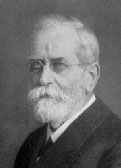 The famous German indologist Albrecht Weber (1825-1901) was a notorious racist whose German nationalistic tendencies were thinly veiled as works on Indian philosophy and culture.
The famous German indologist Albrecht Weber (1825-1901) was a notorious racist whose German nationalistic tendencies were thinly veiled as works on Indian philosophy and culture.
When Humbolt lauded praise upon the Bhagavad-gita, Weber became disgusted. His immediate response was to speculate that the Mahabharata and Gita were influenced by Christian theology -
‘The peculiar colouring of the Krishna sect, which pervades the whole book, is noteworthy: Christian legendry matter and other Western influences are unmistakably present...’
Two Sanskrit scholars, Franz Lorinser and E. Washburn Hopkin, were quick to support Weber’s postulation. However, their theory lacked any hard evidence and was considered so ludicrous that most scholars in European universities rejected it, despite their Christian leanings. Nevertheless, the propagation of this eroneous hypothesis played its mischief and was mainly responsible for the hesitation of the Western scholars to assign to the Mahabharata a date, earlier than that of the Christian era.
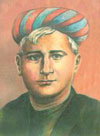 In Chapter 4 of his book Krishnacharita, the famous Bengali writer, Bankim Chandra Chattopadhyaya, spoke about Weber as follows –
In Chapter 4 of his book Krishnacharita, the famous Bengali writer, Bankim Chandra Chattopadhyaya, spoke about Weber as follows –
'The celebrated Weber was no doubt a scholar but I am inclined to think that it was an unfortunate moment for India when he began the study of Sanskrit. The descendants of the German savages of yesterday could not reconcile themselves to the ancient glory of India. It was therefore, their earnest effort to prove that the civilization of India was comparatively of recent origin. They could not persuade themselves to believe that the Mahabharata was composed centuries before Christ was born'.
Weber and his collegue Otto Boehtlingk prepared the famous Sanskrit dictionary called the 'Sanskrit Worterbuch'. Prof. Ernst Kuhn was also one of their assistants. Being mainly based on speculative and incorrect principles of philology, the work was unreliable and misleading. The dictionary was subject to severe criticism by Theodore Goldstucker (1821-1872), who was professor of Sanskrit at the University College in London. Weber was so disturbed by Goldstucker’s criticism that he resorted to abusing the Professor with the coarsest words possible. He added that the views of Goldstucker on his Worterbuch showed ‘a perfect derangement of his mental faculties’, since he was not willing to dismiss the authority of the Vedic scholars so easily. Replying to their undignified attacks, Goldstucker exposed the ‘scholarship’ of the likes of Roth, Boehtlingk, Weber and Kuhn and wrote:
'It will, of course, be my duty to show, at the earliest opportunity, that Dr. Boehtlingk is incapable of understanding even easy rules of Panini, much less those of Katyayana and still less is he capable of making use of them in the understanding of Classical texts. The errors in his department of the Dictionary are so numerous... that it will fill every serious Sanskritist with dismay, when he calculates the mischievous influence which they must exercise on the study of Sanskrit philology'.
He further remarked:
'....that questions which ought to have been decided with the very utmost circumspection and which could not be decided without very laborious research have been trifled with in the Worterbuch in the most unwarranted manner…When I see that the most distinguished and most learned Hindu scholars and divines - the most valuable and sometimes the only source of all our knowledge of ancient India - are scorned in theory, mutilated in print, and, as a consequence, set aside in the interpretation of Vaidik texts; ...when a clique of Sanskritists of this description vapours about giving us the sense of the Veda as it existed at the commencement of Hindu antiquity; ...when I consider that those whose words apparently derive weight and influence from the professional position they hold...then I hold that it would be a want of courage and a dereliction of duty, if I did not make a stand against these Saturnalia of Sanskrit Philology.’
Refering to Prof. Kuhn, Goldstucker was positively venomous –
'(Professor Kuhn) was 'an individual whose sole connection with Sanskrit studies consisted in handing Sanskrit books to those who could read them, a literary naught, wholly unknown, but assuming the airs of a quantity, because it had figures before it that prompted it on, a personage who, according to his own friends, was perfectly ignorant of Sanskrit'.
However, we should not make the mistake that Herr Goldstucker was championing the cause of the Vedic literatures. Goldstucker’s skirmish with his fellow indologists was purely on an academic basis. Goldstucker was of the opinion that the people of India were burdened by Vedic religion which had simply brought them world-wide ‘contempt and ridicule’. He thus proposed to re-educate the Indians with Western values. Goldstucker wrote –
'The means for combating that enemy is as simple as it is irresitable: a proper instruction of the growing generation of its ancient literature.’ 21
In his book, ‘Inspired Writings of Hinduism’ Goldstucker attacked the validity of the Vedas, stating that his aim was to inspire the new generation of Indians that their religious superstitions were backwards. This could only be achieved by scholastically destroying their sastras. The only recourse for the new generation would be to adopt European values in order to improve their character.









Conclusion
Nowadays modern indologists are not the same as their crusading predecessors of the 19th Century, nor do college Sanskrit departments award monetary prizes for ‘the best refutation of the Hindu religious system’. Yet many of the speculative theories of Mueller and his contempories are still treated as absolute facts. Naturally, these pioneers of Indology are held in high regard because they were the first forerunners in that field of study. In todays academic circles, scholars of Indology have no interest in imposing their personal religious views upon others in order to convert them to Christianity (modern academics prefer to take a secular stance), nor do they wish to politically and racially subjugate the ‘Hindoos’. Their approval of the conclusions of their predecessors is mostly out of academic habit.
Previously, early indologists openly expressed their biased opinions that the Vedic scriptures were fraudulent and nonsensical. We have quoted many examples of such statements, however we will present one more from Prof. Monier-Williams –
'Yes, after a lifelong study of the religious books of the Hindus, I feel compelled to publicly express my opinion of them. They begin with much promise amid scintillations of truth and light and occasional sublime thoughts from the source of all truth and light , but end in sad corruptions and lamentable impurities.’22
Today scholars are not so blatent and arrogant in their dismissal of the Vedic texts, though they express the same conclusions in a more moderate language, often giving the impression that they are favorably disposed towards Vedic culture. In a much more subtle way, modern indologists have inherited the pioneers’ bias, and although todays bias is ‘empirical’ rather than ‘imperialist’ or ‘evangelical’, it amounts to the same thing.
Some of the one-sided prejudices that they have inherited can be summed up as follows:
(A) Due to religious prejudice, early indologists were reluctant to give the Vedas a higher antiquity than the earliest portion of the Old Testament and place them beyond 2500 B.C. In fact, the dating that they did give to the Vedas was totally speculative and unfounded.
(B) Due to a poor fund of knowledge, early indologists relegated all the Vedic texts and the personalities found in them to the realm of mythology. Furthermore, these texts were written by some very late anonymous persons who attributed their works to 'mythical' sages.
(C) Early indologists were responsible for creating the outlandish and groundless theory of the aryan invasion, according to which the very existence of the Solar and Lunar Dynasties of kings are totally denied. Such a assumption was solely based upon racial, religious and political motivations. Ironically, this theory is taught in every school throughout the Subcontinent to this day!
(D) Early indologists were responsible for the corrupt translations of Vedic works, and misrepresentation of the Vedic culture.
(E) Early indologists were responsible for rejecting the idea that Sanskrit was the mother of at least the Indo-European languages; as at first very ably propounded by Franz Bopp, and often mentioned by ancient Indian authors.
It is extremely lamentable that some modern-day Indian Sanskrit scholars continue to glorify such European indologists as unbiased students of Sanskrit literature, whose sole aim was to aquire knowledge for its own sake. The above facts in this essay show very clearly the true motivations of these so-called pioneers of indological studies.
![]() However, what is even m However, what is even more lamentable is that the dream of Macaulay has come true—his vision of creating a caste of ‘Brown Sahibs’ has become a reality. Nowadays, whilst the western world turns it’s face towards Indian philosophy for the answers to life’s complexities, the greatest adversaries of Vedic culture are the Indians themselves—the ‘secular’ politicians, the journalists, the educationalists, in fact the whole Westernised cream of India. And what is even more paradoxical, is that most of them are supposedly Hindus.
al system, without trying to adapt it to the unique Indian mentality and psychology.
However, what is even m However, what is even more lamentable is that the dream of Macaulay has come true—his vision of creating a caste of ‘Brown Sahibs’ has become a reality. Nowadays, whilst the western world turns it’s face towards Indian philosophy for the answers to life’s complexities, the greatest adversaries of Vedic culture are the Indians themselves—the ‘secular’ politicians, the journalists, the educationalists, in fact the whole Westernised cream of India. And what is even more paradoxical, is that most of them are supposedly Hindus.
al system, without trying to adapt it to the unique Indian mentality and psychology.
The result of this is a youth which apes the West.
Some may argue that in order for India to progress materially, it is important for her to accept western education and ethics. In the last ten years in India, violence, rape, theft and other social problems have increased to a massive extent. This is only due to the atheistic western-oriented education that India has forced upon its’ youth. In fact, in every sphere of material activity, India tries to imitate the west with farcical or disasterous results.
In the realm of entertainment, India produces more films than any country in the world, yet the content of those movies is likened to imbeciles, since the substance of these films incites lust and violence. That is because they are based upon western movies. India has also been introduced to cable-TV so it can see how the rest of the world behaves.
Since the British left India, Indian dress code has also changed considerably. Indian men wear western trousers and shirts. If they wear something traditional, they are thought of as ‘old-fashioned.’ Nowadays in major cities in India, it is not uncommon to see young women wearing T-shirts and jeans rather than the sari. Such a drastic change in lifestyle reflects the Indian psyche today.
In essence, the youth of India today are taught to be ashamed of being Indian.They are ashamed of their religion and the ethics given by their forefathers. They have been made to believe that embracing westernization is the only way they can progress in life. In this way, the British are still masters of India and the proselytizing Christian indologists have won the day.
Until India wakes up to her mistake and strives to rediscover her spiritual heritage, she will continue to produce ‘Brown sahibs’ and will remain under the yoke of the ghosts of Macaulay and the British educational system.
Bibiliography
The Aryans and Ancient Indian History by Subhash Kak
The Myth of the Aryan Invasion of India by David Frawley
Gods, Sages and Kings by David Frawley
The Demise of the Aryan Invasion/Race Theory by Prof. Dinesh Agrawal
Western Indologists: A Study in Motives by Purohit Bhagavan Dutt
World Views: Vedic Vs Western by Sadaputa Dasa
Readings in Vedic Literature by Satsvarupa dasa Goswami
Motives Of 19th Century Western Scholars by Dr. Shreerang Godbole
Antiquity and Continuity of Indian History by Prasad Gokhale
Vaisnava India by Svami B.G. Narasingha Maharaja
The Seventh Goswami by Rupa Vilasa Dasa
_____________________
1 Ram Swarup's Introduction to the Reprint of 'Muhammad and the Rise of Islam' by Dr. D.S. Margoliouth; Voice of India, 1985, pp. v-vi
2 John Bentley - ‘Historical View of the Hindu Astronomy’ (1825)
3 Encyclopedia Britannica, 1950, Vol. 4, p. 860
4 Richard Fox Young – ‘Resistant Hinduism’, Vienna, 1981, p. 34
5 V. D. Mahajan - ‘Ancient India’ p.1
6-S.N.Mukharji – ‘Sir William Jones: A Study in Eighteenth Century British Attitudes to India’
7 - A similar critisism came from Max Mueller in his book ‘India - What it can teach us?’ "The book which I consider to be most mischievous, nay which I hold responsible for some of the greatest misfortunes that have happened to India, is Mill's 'History of British India'...Mill, in his estimate of the Hindu character, is chiefly guided by Dubois, a French missionary and by Orme and Bucahnan, Tennant and Ward, all of them neither very competent nor unprejudiced judges. Mill, however, picks out all that is most unfavorable from their works, and omits the qualifications which even these writers felt bound to give in their wholesale condemnation of the Hindus" (pp. 39-40).
8 - It was Lord Bentinck who seriously considered the possibility of dismantling the Taj Mahal and selling the marble to meet the shortage of money in the Company’s treasury. He was prevented because "the test auction of materials from the Agra palace proved unsatisfactory."
9-‘Life and letters of Max Mueller’, 1902, p. 328
10 –‘Hinduism: a Religion to Live By’ - Nirad C. Chaudhari p. 116-117
11 – ‘Life and letters of Max Mueller ‘Vol. I, pp. 190-92
12 –‘The Hindu world, an encyclopedic survey of Hinduism’ - By George Benjamin Walker, New York: Praeger, 1968. 2v.)
13 –‘The Life and Letters of the Rt. Hon. Fredrich Max Mueller’, Longmans, London, 1902, Volume I, p. 328
14-‘Missionaries in India: Continuities, Changes, Dilemmas’ - By Arun Shourie p. 139
15- ‘Life and letters of Max Mueller’ Vol. II, Ch. XXXII., page 339
16- ‘Life and letters of Max Mueller’ Vol. II., Ch. XXXIV., pages 415-416
17 -Max Mueller – ‘Biographies of Words and the Home of the Aryas’, 1888, pg 120
19 - ‘Satyartha Prakash’, Third Edition, p. 278
20 –Monier Monier-Williams –‘Religious Thought and Life in India’ p.10
21 -Theodore Goldstucker, ‘Inspired Writings of Hinduism’ p.115
22 –Monier Monier-Williams -‘Religious Thought’ –pp.34-35




